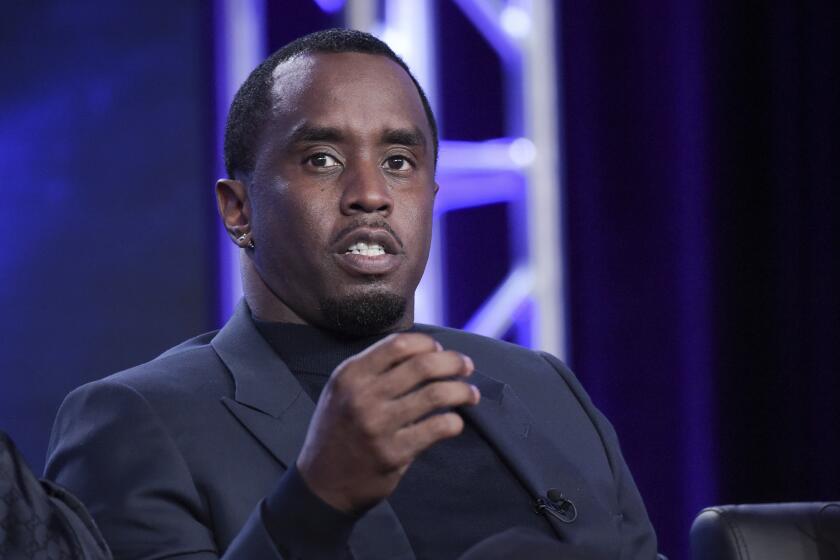The Super Freshman Class of ’88 : Tracy Chapman wasn’t the year’s only new artist with individuality and a point of view
Tracy Chapman . . . Tracy Chapman . . . Tracy Chapman.
No question about it: The 24-year-old folksinger from Cleveland-via-Boston was clearly the pop arrival of 1988.
Chapman’s debut album--a remarkable blend of understated commentary and disarming craft--has sold more than 6 million copies worldwide and Chapman was a key figure in Amnesty International’s celebrated six-week, five-continent tour to promote human rights.
But Chapman’s success was more than merely a victory for her art.
By introducing tales of society’s underclass (from welfare mothers to children terrorized by racism) to the pop charts, Chapman sent a liberating message to radio programmers and record executives of the increasing willingness of pop audiences to deal with music with content.
More important, Chapman was far from the only promising new artist with individuality and point of view.
The freshman Class of 1988 was an unusually impressive collection of talent, the best of which spoke about social issues with a commitment and passion associated with ‘60s rock.
Bob Krasnow--a record industry veteran who turned a struggling Elektra Records into one of the industry’s most respected and profitable labels--believes there is an return of the ‘60s spirit in pop.
“I think we’ve finally got to the other side of the so-called disco age,” said Krasnow, who signed and championed Chapman at Elektra.
“The point where artists like Tracy and bands like 10,000 Maniacs, the Sugarcubes, Hothouse Flowers . . . come together thematically is that they talk about socially relevant issues.”
In an age where so many record executives are attorneys or businessmen, Krasnow, chairman of Elektra, is primarily a music man--someone with “ears” and a point of view about talent.
“I saw an article in a Miami paper earlier this year and the reviewer said something about the new Talking Heads album that kind of stuck with me . . . that it’s possible with the album to dance and think at the same thing.
“To me, it’s a good analysis of what records can be today--records that you can not only enjoy, but which can stimulate your feelings on a lot of different levels. As a ‘60s person, that’s very gratifying.”
Two factors, Krasnow suggested, contributed to the increasing rise in the late ‘80s of important new talents: A desire among record-buyers for new heroes and voices, and a record industry that is willing to take chances on adventurous new artists because business has been so strong.
“The record business is in extremely high times right now, so you are able to exercise a lot of judgments financially where maybe 10 years ago, you wouldn’t take those risks because of the (climate) of the business at the time,” he said.
The most obvious thing about the Class of 1988 is that the new voices are exceptionally diverse. Joining Chapman are such independent voices as Iceland’s mysterious Sugarcubes, Ireland’s uplifting Hothouse Flowers, Texas’ provocative Michelle Shocked and Los Angeles’ unsettling Jane’s Addiction.
Only time will tell how many of these musicians--if any--will grow sufficiently in artistry or influence to rank with the greats in rock history, or whether the Class of ’88 will ever rival the best of past rock classes (see related article).
No one these days, even someone with as strong a start as Chapman or the Sugarcubes, seals its place in the Rock Hall of Fame with a single album the way artists did in the ‘50s when it was possible to demonstrate sufficient original vision in just a few singles to achieve rock greatness.
One of the tests of greatness today is sustained excellence. Prince’s “Dirty Mind” album alone in 1980 contained as much striking and influential music as some of rock’s most prized pioneers, but it took three more excellent albums--”Controversy,” “1999” and “Purple Rain”--until he probably cemented his place in the Rock Hall of Fame.
The following artists, however, exhibited enough traces of greatness to distinguish them from the hundreds of other artists that made their debuts this year. They don’t all deal with social issues by any means, but there is sense of honesty and imagination that connects them. As many as five may make my own list of the year’s 10 best albums.
Though some of the artists had earlier releases on small, independent labels, they are considered part of the Class of ’88 because they all made their major label debut this year.
The artists, alphabetically:
Big Pig’s “Bonk” (A&M;)--On record, Big Pig’s songs (a bit of Eurythmics here, a bit more Eurythmics there) are sometimes thin conceptually, but the Australian band’s mix of mainstream pop craft and art-rock instincts comes alive on stage. At the Roxy last May, the band--thanks to impassioned vocals and marvelously intricate rhythms served up by three percussionists and a bassist--offered as much sensual rhythm as the early Talking Heads.
Tracy Chapman’s “Tracy Chapman” (Elektra)--There’s more to enjoy (and respect) in this album than “Fast Car,” but that single--the odds-on favorite to win the record of the year Grammy--summarizes most of what is special about Chapman’s highly personalized brand of urban folk. The song--a complex tale of a woman trapped between her dreams, her fears and imagined loyalties--is the most effective kind of protest. As with other tunes on the album, the message is so skillfully underplayed that it appeals to one’s sense of fair play as well as outrage. The best advice for Chapman is that she take all the time that is needed to make the best possible album next time because the expectations will be dangerously high.
Cowboy Junkies’ “The Trinity Session” (RCA)--It’s too late to know what Hank Williams would have thought about this Canadian band’s version of “I’m So Lonesome I Can Cry,” but Lou Reed has declared the Junkies’ rendition of “Sweet Jane” to be the “best and most authentic” he has ever heard. But it figured Reed would like a band that plays country music in the mostly dark, slow-pulse way the Velvet Underground would have. The question is whether Margo Timmins’ single-color vocals--slow, whispery, downbeat--have enough shading to keep things moving for an hour on stage, but the best of them stop you dead in your tracks on this record. We’ll get an answer to that question, by the way, when the Junkies play the Lingerie on Dec. 7.
The Godfathers’ “Birth, School, Work, Death” (Epic)--This British group plays the kind of tough, monochromatic, slashing-guitar rock associated with the early Stones and Who, and that sound is a fitting backdrop for some of the fiercest songs about social discontent in England since the Clash and the Jam. The title track is a virtual litany of working class Angst: “I’ve been abused and I’ve been confused/ And I’ve kissed Margaret Thatcher’s shoes/ I been high and I been low/ And I don’t know where to go.” These guys have their sights on something important and the next album should tell how close to the target they’ll eventually land.
Hothouse Flowers’ “People” (London/PolyGram)--Few bands since fellow Irishmen U2 have arrived with such an arresting combination of charismatic lead singer (Liam O’Maonlai), eagerness to reach out to the audience and an unwavering belief in the cleansing and inspirational qualities of music. Unlike so many bands that start off tentatively and seem willing to bend in whatever direction the public wants, the Flowers assert its course with an unyielding independence and heart. The results--both the moments of comfort and challenge--were among the year’s most affecting in rock.
House of Freaks’ “Monkey on a Chain Gang” (Rhino)--Rather than an unruly punk outfit suggested by its name, Freaks (a duo consisting of singer-guitarist Bryan Harvey and drummer Johnny Hott) blends melodic and inviting ‘60s pop-rock songs with a darkly intense country blues spirit. The best songs are unusually thoughtful and involving looks at the search for values and balance in the face of disappointment and loss.
Jane’s Addiction’s “Nothing’s Shocking” (Warner Bros.)--There’s a strange, but fascinating aura--almost hallucinatory--that hangs over this Los Angeles band’s concerts as Perry Farrell--who has been described as an Iggy Pop with dreadlocks--bounds about the stage in odd, unnerving and utterly unpredictable ways. Meanwhile, the band plays with such power you’d think someone had given it a transplant of the assault of Led Zeppelin and the anarchy of Black Flag. The intriguing thing about the album is that it is equally haunting even though it barely prepares you for what to expect when the band hits the stage.
The Primitives’ “Lovely” (RCA)--Tracey Tracey’s blonde locks and the band’s deftness with bouncy, pop-rock melodies makes Blondie comparisons inevitable, but the Primitives’ imagination was as much fueled by Petula Clark (there’s no apology in the band’s music for its mass-market tastes) and Jesus and Mary Chain feedback (the band knows a good sound when it hears it). This English group’s allegiance is to catchy, fun-filled pop records, and it lives up to the challenge in three-fourths of the time it steps to the microphone. The Primitives make their local debut Monday at the Roxy.
Michelle Shocked’s “Short, Sharp, Shocked” (Mercury/Polygram)--This lanky, 26-year-old Texan, who writes about social and sexual politics with a sometimes sly, sarcastic edge, actually made her album debut last year with a series of songs recorded informally in 1986 on a portable tape machine at the Kerrville Folk Festival. But this album is the real starting line for her career. Guided by ace producer Pete Anderson, Shocked swings engagingly through such varied, yet familiar styles as the Memphis rockabilly of “Hello Hopeville,” the seductive blues of “If Love Was a Train” and the contemporary folk canvas of “Anchorage” without letting listeners ever forget that they are in the presence of a spirited and original artist.
Shinehead’s “Unity” (Elektra)--Rap is one of the most vital forms of ‘80s pop (Public Enemy’s “It Takes a Nation of Millions to Hold Us Back” is a contender for album of the year), but some of the grumbling about the music being too repetitious and filled with in-crowd jargon is true. That’s why Shinehead (Carl Aiken) could be a valuable sidestep. A native Jamaican who has spent most of his life in New York City, he doesn’t seem restricted by rap’s accepted rules. He’s not the first to mix reggae and rap, but he adds an enticing pop-rock consciousness (a touch of the Beatles’ “Come Together” in the album’s title track) to the mix. The result is a freedom of form that may take what is promising music at this point to a more rewarding and influential level.
The Sugarcubes’ “Life’s Too Good” (Elektra)--This band, from Iceland, is more than the sum of its parts. There are bits of the infectious pop of Blondie and the somewhat arty humanism of 10,000 Maniacs, all served up with a raw, Mixmaster dose of post-punk energy. But the mystery ingredient is a wry Icelandic pop perspective that delights in lyrics that avoid quick, or even prolonged interpretation. At the end of the band’s album and stage shows, you’re likely to scratch your head and ask just what all the songs are about. Yet the music has such delicious textures and is served with such delightful spunk that you can’t help but going back for more. An album of the year contender.
More to Read
The biggest entertainment stories
Get our big stories about Hollywood, film, television, music, arts, culture and more right in your inbox as soon as they publish.
You may occasionally receive promotional content from the Los Angeles Times.






